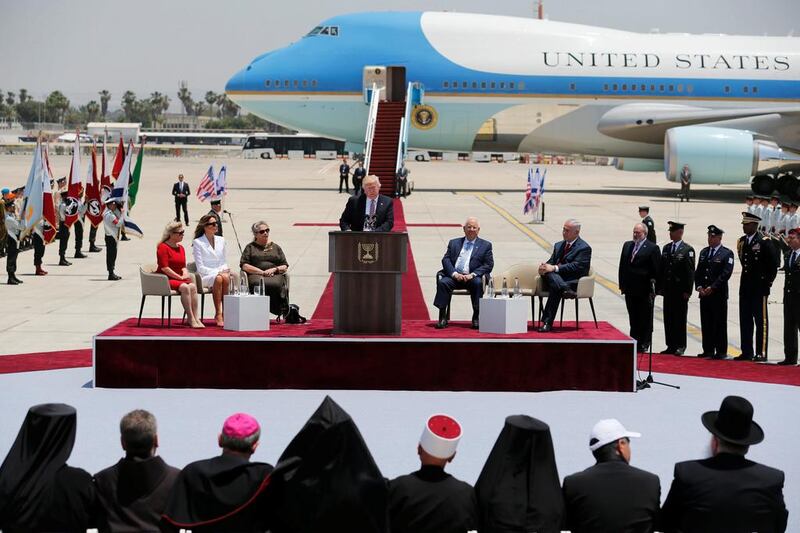Jerusalem // Donald Trump arrived in Israel from Saudi Arabia on Monday promising a new opportunity for regional peace.
The businessman turned US president has cast Israeli-Palestinian peace as the “ultimate deal.”
At a reception on the tarmac at Tel Aviv’s airport, where he was received by Israeli prime minister Benjamin Netanyahu and Israeli president Reuven Rivlin, Mr Trump broadened his promise for peace.
“We have before us a rare opportunity to bring security and stability and peace to this region and to its people, defeating terrorism and creating a future of harmony, prosperity and peace,” Mr Trump said. “But we can only get there working together.”
Mr Netanyahu said he also shared a commitment to peace. “We’ve already made peace with Egypt and with Jordan, and Israel’s hand is extended in peace to all our neighbours, including the Palestinians,” he said.
Mr Trump moved on to Jerusalem’s Old City, where he became the first sitting US president to visit the Western Wall, Judaism’s second holiest site.
Mr Netanyahu had wanted to accompany Mr Trump to the wall, which sits beneath Haram Al Sharif, Islam’s third holiest site, and the Temple Mount, Judaism’s holiest site. However, the state department refused as the US considers the status of the Old City, which Israel occupied 50 years ago and later annexed unilaterally, a topic for peace negotiations.
On Tuesday Mr Trump will visit the occupied West Bank and meet Palestinian president Mahmoud Abbas.
Palestinians in the Old City said they were wary of being used by Mr Trump to advance a peace process that would bolster the president’s image but do nothing to change their lives.
The US president’s visit to Riyadh, during which he called for unity to combat extremism and oversaw the signing of US$380 billion (Dh1.4 trillion) of business deals, was hailed as a success by White House officials and Arab leaders. But Mr Trump is in dire need of further foreign policy success as he faces scrutiny over his alleged campaign ties with Russia back home.
“Trump is coming for his own benefit,” said Maher Abu Dahoud, a 40-year-old waiter sitting on a worn stone pathway on Al Wad street before Mr Trump was due to visit the Church of the Holy Sepulchre and then the Western Wall. Nearby, throngs of Israeli policemen stood by fabric and metal barricades that blocked the winding corridors that lead to the holy sites.
The restaurant where Mr Abu Dahoud works was closed for the afternoon as part of a Palestinian general strike in support of prisoners on hunger strike in Israeli jails. The strike, which shuttered shops throughout Jerusalem and the West Bank, seemed to be a cause of greater concern for Palestinians than Mr Trump’s visit.
Diana Buttu, a former Palestinian negotiator and analyst, said Palestinians have good reason to be sceptical of Mr Trump, given that the US president appointed David Friedman, a supporter of Jewish settlements on occupied land, as US ambassador to Israel. Mr Friedman arrived in Israel last week and immediately visited the Western Wall, giving the holy site a traditional kiss.
Mr Trump’s daughter Ivanka visited the women’s side of the wall on Monday. She converted to Judaism to marry businessman Jared Kushner, an orthodox Jew who is now one of the president’s top aides.
Ms Buttu also named Trump supporter Sheldon Adelson, the pro-Israel casino magnate who donated to his election campaign, as evidence of the president’s bias towards Israel. Mr Adelson is reportedly disappointed in Mr Trump for dragging his feet on a campaign promise to move the US embassy from Tel Aviv to Jerusalem. The mostly symbolic act would signal to Israel that America recognises Jerusalem as its capital.
Even so, Ms Buttu was sceptical that Mr Trump had changed from his avowed pro-Israel election stance, noting that life had become more difficult for Palestinians since he took office.
Mr Trump said settlements “may not be helpful” to the peace process, but has yet to proffer a full-throated denunciation of the settlements, Ms Buttu said.
“When it comes to those of us that are living here and dealing with the situation on the ground, you can feel the checkpoints getting worse and the settlements going up and the homes coming down,” said Ms Buttu, speaking of an increase in home demolitions in Palestinian areas since Mr Trump took office.
Mr Trump’s meeting with Mr Abbas will be his second this month following a warm visit to the White House in early May. But that means little to most Palestinians, said Ms Buttu. Mr Abbas is facing challenges to his legitimacy at home for failing to stand up to the Israeli occupation.
When Mr Trump travels to Bethlehem on Tuesday, he will not be meeting with the Palestinian people, but with Mr Abbas, said Mr Abu Dahoud.
But while many Old City Palestinians expressed doubts about Mr Trump, one 67-year-old who had come from Hebron to collect money for orphans was blissfully ignorant about the day’s events in Jerusalem.
“This is the first I have heard of him,” said Ribhi Abu Snene when asked what he thought of the US president.
foreign.desk@thenational.ae





